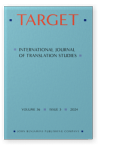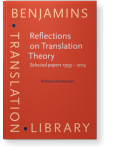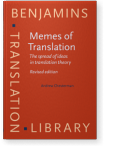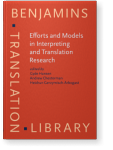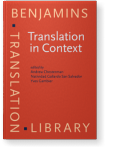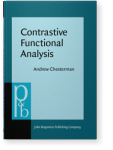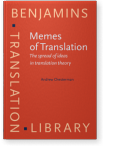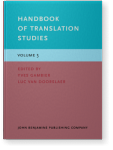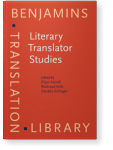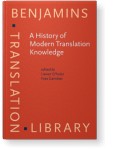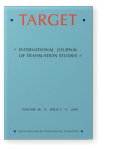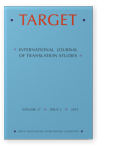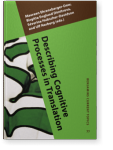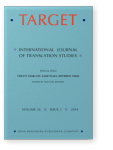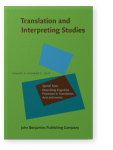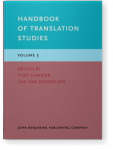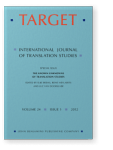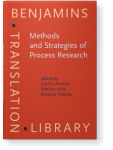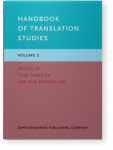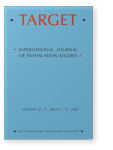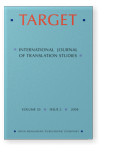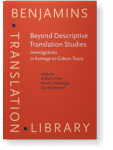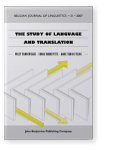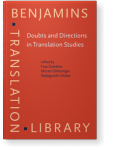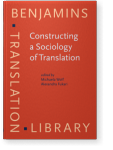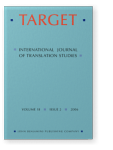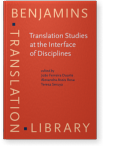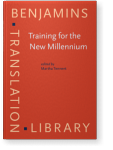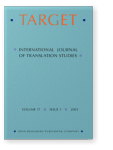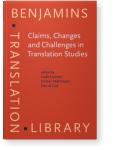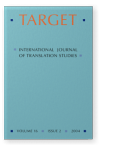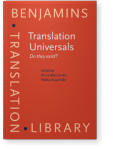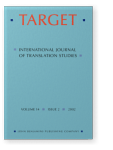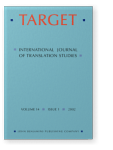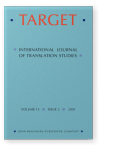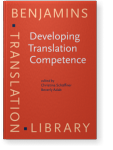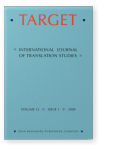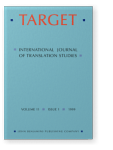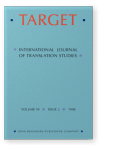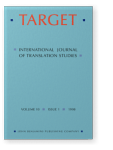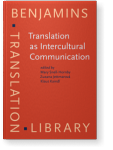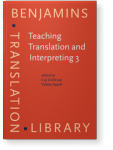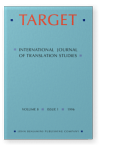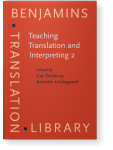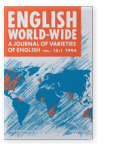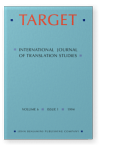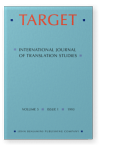Andrew Chesterman
List of John Benjamins publications for which Andrew Chesterman plays a role.
Journal
Reflections on Translation Theory: Selected papers 1993 - 2014
Andrew Chesterman
[Benjamins Translation Library, 132] 2017. x, 396 pp.
Subjects Translation Studies
Memes of Translation: The spread of ideas in translation theory. Revised edition
Andrew Chesterman
[Benjamins Translation Library, 123] 2016. xii, 225 pp.
Subjects Semantics | Translation Studies
Efforts and Models in Interpreting and Translation Research: A tribute to Daniel Gile
Edited by Gyde Hansen, Andrew Chesterman and Heidrun Gerzymisch-Arbogast
[Benjamins Translation Library, 80] 2008. ix, 302 pp.
Subjects Interpreting | Translation Studies
Translation in Context: Selected papers from the EST Congress, Granada 1998
Edited by Andrew Chesterman, Natividad Gallardo San Salvador and Yves Gambier
[Benjamins Translation Library, 39] 2000. x, 393 pp.
Subjects Translation Studies
Contrastive Functional Analysis
Andrew Chesterman
[Pragmatics & Beyond New Series, 47] 1998. viii, 230 pp.
Subjects Comparative linguistics | Discourse studies | Functional linguistics | Pragmatics | Semiotics | Translation Studies
Memes of Translation: The spread of ideas in translation theory
Andrew Chesterman
[Benjamins Translation Library, 22] 1997. vii, 219 pp.
Subjects Semantics | Translation Studies
2021 Translator studies Handbook of Translation Studies: Volume 5, Gambier, Yves and Luc van Doorslaer (eds.), pp. 241–246 | Article
2021 Chapter 15. View from left field: The curious case of Douglas Hofstadter Literary Translator Studies, Kaindl, Klaus, Waltraud Kolb and Daniela Schlager (eds.), pp. 279–292 | Chapter
2018 Chapter 7.5. Translation ethics A History of Modern Translation Knowledge: Sources, concepts, effects, D’hulst, Lieven and Yves Gambier (eds.), pp. 443–448 | Chapter
2016 House, Juliane, ed. 2014. Translation: a multidisciplinary approach Target 28:1, pp. 158–163 | Review
2015 Inghilleri, Moira. 2012. Interpreting Justice. Ethics, Politics and Language Target 27:2, pp. 313–318 | Review
2015 Models of what processes? Describing Cognitive Processes in Translation: Acts and events, Ehrensberger-Dow, Maureen, Birgitta Englund Dimitrova, Séverine Hubscher-Davidson and Ulf Norberg (eds.), pp. 7–20 | Article
Toury (1995; 2012) distinguishes between cognitive translation acts on the one hand, and sociological translation events on the other; a translation act is embedded in a translation event, and both acts and events are seen as processes. He also explains three senses of ‘translation problem,’ which… read more
2014 Boase-Beier, Jean. 2011. A Critical Introduction to Translation Studies Twenty Years EST: Same place, different times, Boyden, Michael (ed.), pp. 274–279 | Review
2013 Models of what processes? Describing Cognitive Processes in Translation: Acts and events, Ehrensberger-Dow, Maureen, Birgitta Englund Dimitrova, Séverine Hubscher-Davidson and Ulf Norberg (eds.), pp. 155–168 | Article
Toury (1995, 2012) distinguishes between cognitive translation acts on the one hand, and sociological translation events on the other; a translation act is embedded in a translation event, and both acts and events are seen as processes. He also explains three senses of ‘translation problem,’ which… read more
2012 Models in Translation Studies Handbook of Translation Studies: Volume 3, Gambier, Yves and Luc van Doorslaer (eds.), pp. 108–114 | Article
2012 Baker, Mona. 2011. In Other Words. A coursebook on translation The Known Unknowns of Translation Studies, Brems, Elke, Reine Meylaerts and Luc van Doorslaer (eds.), pp. 191–193 | Review
2011 Reflections on the literal translation hypothesis Methods and Strategies of Process Research: Integrative approaches in Translation Studies, Alvstad, Cecilia, Adelina Hild and Elisabet Tiselius (eds.), pp. 23–35 | Article
This paper examines the well-known literal translation hypothesis and discusses its significance for translation theory. The hypothesis claims that as translators process a given text chunk, they tend to start from a literal version of the target text, and then work towards a freer version. The… read more
2011 Translation universals Handbook of Translation Studies: Volume 2, Gambier, Yves and Luc van Doorslaer (eds.), pp. 175–179 | Article
2010 Hermans, Theo. 2007. The Conference of the Tongues Target 22:2, pp. 356–362 | Review
2008 The status of interpretive hypotheses Efforts and Models in Interpreting and Translation Research: A tribute to Daniel Gile, Hansen, Gyde, Andrew Chesterman and Heidrun Gerzymisch-Arbogast (eds.), pp. 49–61 | Article
In the natural sciences, the task of the researcher is usually seen as the generation and testing of hypotheses. These hypotheses are taken to be possible answers to questions concerning the description, prediction, and explanation of natural phenomena. But there is also another kind of hypothesis,… read more
2008 On explanation Beyond Descriptive Translation Studies: Investigations in homage to Gideon Toury, Pym, Anthony, Miriam Shlesinger † and Daniel Simeoni (eds.), pp. 363–380 | Article
2007 Similarity Analysis and the Translation Profile The Study of Language and Translation, Vandeweghe, Willy, Sonia Vandepitte and Marc Van de Velde (eds.), pp. 53–66 | Article
2007 What is a unique item? Doubts and Directions in Translation Studies: Selected contributions from the EST Congress, Lisbon 2004, Gambier, Yves, Miriam Shlesinger † and Radegundis Stolze (eds.), pp. 3–13 | Chapter
The so-called unique items hypothesis claims that translations tend to contain fewer “unique items” than comparable non-translated texts. This is proposed as a potential translation universal, or at least a general tendency. A unique item is one that is in some sense specific to the target language… read more
2007 Bridge concepts in translation sociology Constructing a Sociology of Translation, Wolf, Michaela and Alexandra Fukari (eds.), pp. 171–183 | Article
Translation sociology brings back the notion of quality to centre-stage in translation studies, and at the same time adds to the field’s social relevance. A sociological approach allows us to highlight “bridge concepts” which connect textual, cognitive and cultural perspectives, and can thus help… read more
2006 Maria Sidiropoulou, ed. Identity and difference: Translation shaping culture Target 18:2, pp. 391–393 | Subsection
2006 Questions in the sociology of translation Translation Studies at the Interface of Disciplines, Duarte, João Ferreira, Alexandra Assis Rosa and Teresa Seruya (eds.), pp. 9–27 | Article
A broad distinction is proposed between cultural and sociological research into translation. Cultural research focuses on the level of ideas (or memes) while sociological research focuses on people and their observable behaviour. Some theoretical frameworks have been proposed for the analysis of… read more
2005 9. Causality in translator training Training for the New Millennium: Pedagogies for translation and interpreting, Tennent, Martha (ed.), pp. 191–208 | Article
2005 Anderman, Gunilla & Rogers Margaret, eds. 2003. Translation today: Trends and perspectives Target 17:1, pp. 167–170 | Review
2004 Hypotheses about translation universals Claims, Changes and Challenges in Translation Studies: Selected contributions from the EST Congress, Copenhagen 2001, Hansen, Gyde, Kirsten Malmkjær and Daniel Gile (eds.), pp. 1–13 | Article
2004 Petrilli, Susan, ed. 2003. Translation translation Target 16:2, pp. 359–362 | Review
2004 Beyond the particular Translation Universals: Do they exist?, Mauranen, Anna and Pekka Kujamäki (eds.), pp. 33–49 | Article
2002 Shared ground revisited Target 14:1, pp. 143–148 | Discussion
2000 Teaching Strategies for Emancipatory Translation Developing Translation Competence, Schäffner, Christina and Beverly Adab (eds.), pp. 77–90 | Article
2000 Shared Ground in Translation Studies Target 12:1, pp. 151–160 | Discussion
1999 Mark, Shuttleworth & Moira Cowie. 1997. Dictionary of Translation Studies Target 11:1, pp. 172–175 | Review
1998 Causes, Translations, Effect Target 10:2, pp. 201–230 | Article
Conceptual analysis has a role to play in translation studies, but it is a means, not an end. An empirical paradigm gives central importance to testable hypotheses. Empirical research on translation profiles should result in a translation typology: one such typology is discussed. Translations have… read more
1998 Vermeer, Hans J. 1996. A Skopos Theory of Translation: (Some Arguments For and Against) Target 10:1, pp. 155–159 | Review
1997 Ethnics of translation Translation as Intercultural Communication: Selected papers from the EST Congress, Prague 1995, Snell-Hornby, Mary, Zuzana Jettmarová and Klaus Kaindl (eds.), pp. 147–160 | Article
1996 Teaching translation theory: the significance of memes Teaching Translation and Interpreting 3: New Horizons. Papers from the Third Language International Conference, Elsinore, Denmark, 1995, Dollerup, Cay and Vibeke Appel (eds.), pp. 63–72 | Article
1996 On Similarity Target 8:1, pp. 159–164 | Article
1996 Toury, Gideon. 1995. Descriptive Translation Studies and beyond Target 8:1, pp. 197–201 | Review
1994 Karl Popper in the translation class Teaching Translation and Interpreting 2: Insights, aims and visions. Papers from the Second Language International Conference Elsinore, 1993, Dollerup, Cay and Annette Lindegaard (eds.), pp. 89–96 | Article
1994 Ossi Ihalainen - 1941 — 1993 English World-Wide 15:1, pp. 128–130 | Miscellaneous
1993 From ‘Is’ to ‘Ought’: Laws, Norms and Strategies in Translation Studies Target 5:1, pp. 1–20 | Article
Translation studies need to cater for both description and evaluation. This can be achieved via the study of translation norms. The norms governing translation are: (a) professional norms concerning the translation process (= norms of accountability, communication and target-source relation); and… read more
